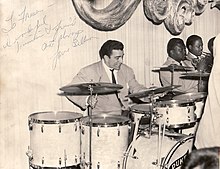Cat Anderson
Cat Anderson | |
|---|---|
 Anderson in New York, c. 1947 | |
| Background information | |
| Birth name | William Alonzo Anderson |
| Also known as | Cat Anderson |
| Born | September 12, 1916 Greenville, South Carolina, U.S. |
| Died | April 29, 1981 (aged 64) Norwalk, California |
| Genres | Jazz |
| Occupation | Musician |
| Instrument | Trumpet |
| Years active | 1930s–1970s |
| Labels | |
William Alonzo "Cat" Anderson (September 12, 1916 – April 29, 1981) was an American jazz trumpeter known for his long period as a member of Duke Ellington's orchestra and for his wide range (more than five octaves), especially his playing in the higher registers.[1]
Biography
Born in Greenville, South Carolina, Anderson lost both parents when he was four years old, and was sent to live at the Jenkins Orphanage in Charleston, where he learned to play trumpet. Classmates gave him the nickname "Cat" (which he used all his life) based on his fighting style. He toured and made his first recording with the Carolina Cotton Pickers, a small group based at the orphanage. After leaving the Cotton Pickers, Anderson played with guitarist Hartley Toots, Claude Hopkins' big band, Doc Wheeler's Sunset Orchestra (1938–1942), with whom he also recorded, Lucky Millinder, the Erskine Hawkins Orchestra, Sabby Lewis's Orchestra, and Lionel Hampton, with whom he recorded the classic "Flying Home No. 2".[2]
Anderson's career took off, however, in 1944, when he joined Duke Ellington's orchestra at the Earle Theater in Philadelphia. He quickly became a central part of Ellington's sound. Anderson was capable of playing in a number of jazz styles, but is best remembered as a high-note trumpeter. He had a big sound in all registers, but could play in the extreme high register (up to triple C) with great power (he was able to perform his high-note solos without a microphone, while other members of a big band were usually amplified for their solos). Wynton Marsalis called him "one of the best" high-note trumpeters.[3] More than just a high-note trumpeter, though, Anderson was also a master of half valve and plunger mute playing. He played with Ellington's band from 1944 to 1947, from 1950 to 1959, and from 1961 to 1971, with each break corresponding to a failure to lead his own big band.
After 1971, Anderson settled in the Los Angeles area, where he continued to play studio sessions, to perform with local bands (including Louie Bellson's and Bill Berry's big bands), and to tour Europe. He died of cancer in 1981.[4]
Discography

- A 'Chat' With Cat (Columbia) (Published in Paris)
- Cat Anderson in Paris (Inner City) Recorded in Paris March 20, 1964
- Cat Anderson Plays at 4 AM (emidisc) Recorded in Paris October 30, 1958
- Cat on a Hot Tin Horn (Mercury) Recorded in New York August 23, 1958
- Old Folks (All Life) Recorded in Paris April 17, 1979
- Cat Speaks (Classic Jazz) Recorded in Paris June 4, 1977
- Ellingtonia - Cat Anderson and the Ellington All Stars (Strand) Recorded 1962
- Americans Swinging in Paris (EMI)
- Swinging the Cat/I Gotta Go Baby (Apollo) May 14, 1947, 78 rpm format
- Mingus Quintet Meets Cat Anderson (Unique Jazz) Recorded in Berlin November 5, 1972
- A Flower is a Lovesome Thing - Ray Nance, Cat Anderson and the Ellington Alumni Recorded 1959
- Cat Anderson, Claude Bolling & Co. (Philips) Recorded in Paris January 1965
- Cat's in the Alley
- Definitive Black and Blue Sessions
- Plays W.C. Handy[5]
As sideman
This section needs expansion. You can help by adding to it. (December 2012) |
With Gene Ammons
- Free Again (Prestige, 1971)
With Duke Ellington
- All Star Road Band Volume 2 (Doctor Jazz, 1964 [1985])
With Lionel Hampton
- Lionel Hampton and His Jazz Giants 77 (CBS MasterWorks, 1977)
With Johnny Hodges
- Ellingtonia '56 (Norgran, 1956)
- The Big Sound (Verve, 1957)
- Triple Play (RCA Victor, 1967)
- Swing's Our Thing (Verve, 1967) with Earl Hines
References
- ^ Cook, Richard (2005). Richard Cook's Jazz Encyclopedia. London: Penguin Books. p. 13. ISBN 0-141-00646-3.
- ^ Carr, Ian; Fairweather, Digby; Priestley, Brian; Alexander, Charles (2004). The Rough Guide to Jazz. Rough Guides. p. 17. ISBN 978-1843532569.
- ^ Trumpet Kings. Dir. Burrill Crohn. Perf. Wynton Marsalis, Louis Armstrong, et al. Video Artists International, Inc., 1989. Videocassette.
- ^ "William Alonzo (Cat) Anderson, Trumpeter With Ellington, Dead". The New York Times. The Associated Press. 2 May 1981.
- ^ "Cat Anderson Discography at Discogs". Discogs.com. Retrieved 2012-03-21.
External links
- Cat Anderson at AllMusic
- Cat Anderson discography at Discogs
- The Duke Ellington Society, TDES, Inc
- Cat Anderson at Find a Grave
